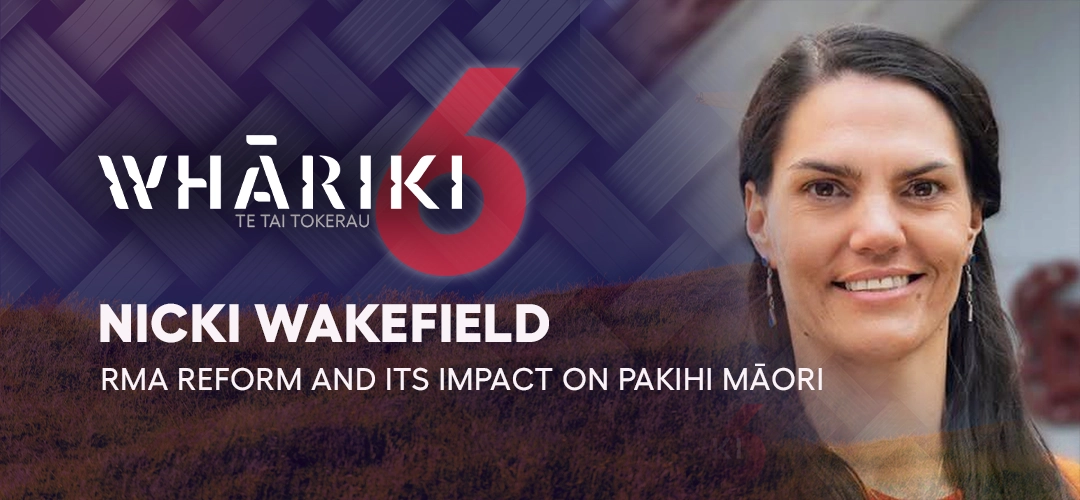Understanding RMA Reform: What It Means for Māori Businesses
By:
Roimata Haika
The Resource Management Act is being replaced by new laws that will reshape how Aotearoa manages land, water, and climate. For Māori businesses, these reforms bring both risks and opportunities that will influence development and decision-making.

The Resource Management Act (RMA) has shaped how Aotearoa manages land, water, and the environment for more than 30 years. Now, it is being replaced by new legislation that promises to streamline processes, strengthen environmental protections, and shift the way communities engage in planning and development.
For Māori businesses, landowners, and iwi entities, this reform represents both a challenge and an opportunity. At a recent session, environmental law specialist Nikki Wakefield broke down the key changes, highlighting why the reforms matter and what pakihi Māori need to prepare for.
Why Reform the RMA?
The RMA was first introduced in 1991 to integrate environmental management under a single piece of legislation. Over time, however, it became seen as overly complex, slow, and inconsistent. Many communities, including Māori, found it difficult to navigate, and projects often faced long delays.
The government’s reform package seeks to address these issues by replacing the RMA with three new laws:
- Natural and Built Environment Act (NBEA) - the main replacement for the RMA, focusing on environmental limits and land use planning.
- Spatial Planning Act (SPA) - requiring long-term regional strategies that align housing, infrastructure, and environmental goals.
- Climate Adaptation Act (CAA) - addressing managed retreat and climate resilience, especially for vulnerable communities.
What This Means for Māori
Nikki explained that Māori interests are central to the success of these reforms, but they also require vigilance to ensure Te Tiriti o Waitangi obligations and Māori rights are upheld in practice.
Key impacts for Māori include:
- Stronger Recognition of Te Ao Māori
The reforms embed concepts such as Te Oranga o te Taiao (the health of the environment) into the framework. This offers new opportunities for Māori worldviews to shape decision-making.
- Role in Regional Spatial Strategies
Māori will need to be involved in the development of spatial plans, which set out how regions grow over the next 30 years. These strategies will directly affect papakāinga housing, whenua development, and regional economies.
- Opportunities for Māori Enterprises
From housing projects to renewable energy and environmental services, the reforms could unlock new opportunities for Māori-led enterprises. But businesses will need to be proactive in engaging with planning processes to benefit.
- Capacity and Resourcing Challenges
While the legislation opens the door for greater Māori participation, Nikki noted the risk that iwi and hapū could be under-resourced to meet these demands. Building capacity will be essential to ensure Māori voices are heard and acted upon.
Practical Implications for Pakihi Māori
For day-to-day business, the reforms may influence:
- Development Consents - processes should become faster, but compliance with stricter environmental standards will be required.
- Sustainability Requirements - industries such as farming, forestry, aquaculture, and tourism may face tighter limits on environmental impacts.
- Partnership with Councils - Māori businesses will need to strengthen relationships with local and regional authorities as governance structures evolve.
Nikki emphasised that businesses should keep informed, build networks, and prepare to adapt early. Those who engage proactively will be best placed to take advantage of new opportunities while navigating regulatory changes.
The Road Ahead
RMA reform is still unfolding, and it will take time for the new framework to bed in. But one thing is clear, Māori perspectives and participation will be critical to shaping the future of resource management in Aotearoa.
For pakihi Māori, this is not just about compliance. It is about influence - ensuring that Māori values, aspirations, and knowledge systems are woven into the way we plan, build, and care for our environment for generations to come.
As Nikki concluded:
“Understanding how these changes will impact Māori businesses is essential. Whether you are developing on whenua, engaging in regional planning, or working alongside councils, the new system will affect you.”
